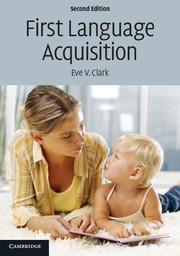Part I - Getting started
Summary
It seems to us that a mother in expanding speech may be teaching more than grammar; she may be teaching something like a world-view.
Roger Brown & Ursula Bellugi 1964[S]peech skills have a tremendous potential for assisting the formation of non-linguistic categories. The total list of such categories that a child must learn is a cognitive inventory of his culture. Speech, therefore, is the principal instrument of cognitive socialization.
Roger Brown 1958bChapter 2: In conversation with children ▪ 21
Chapter 3: Starting on language: Perception ▪ 51
Chapter 4: Early words ▪ 75
Chapter 5: Sounds in words: Production ▪ 94
Chapter 6: Words and meanings ▪ 122
The chapters that follow look at the setting in which infants are first exposed to language and in which they take the first steps towards making use of it. This setting is a social one, where language forms part of a larger system for the communication of wants and desires, attitudes and affect, requests and needs. Language itself is a product of social interaction, and in learning a language, infants learn how to interact, initiate social exchanges, respond to others in maintaining such exchanges, and how to end exchanges. In doing this, they receive pragmatic directions, both tacit and explicit, about how to use language – which words are appropriate (conventional) for particular purposes, which expressions, and which constructions.
- Type
- Chapter
- Information
- First Language Acquisition , pp. 19 - 20Publisher: Cambridge University PressPrint publication year: 2009



